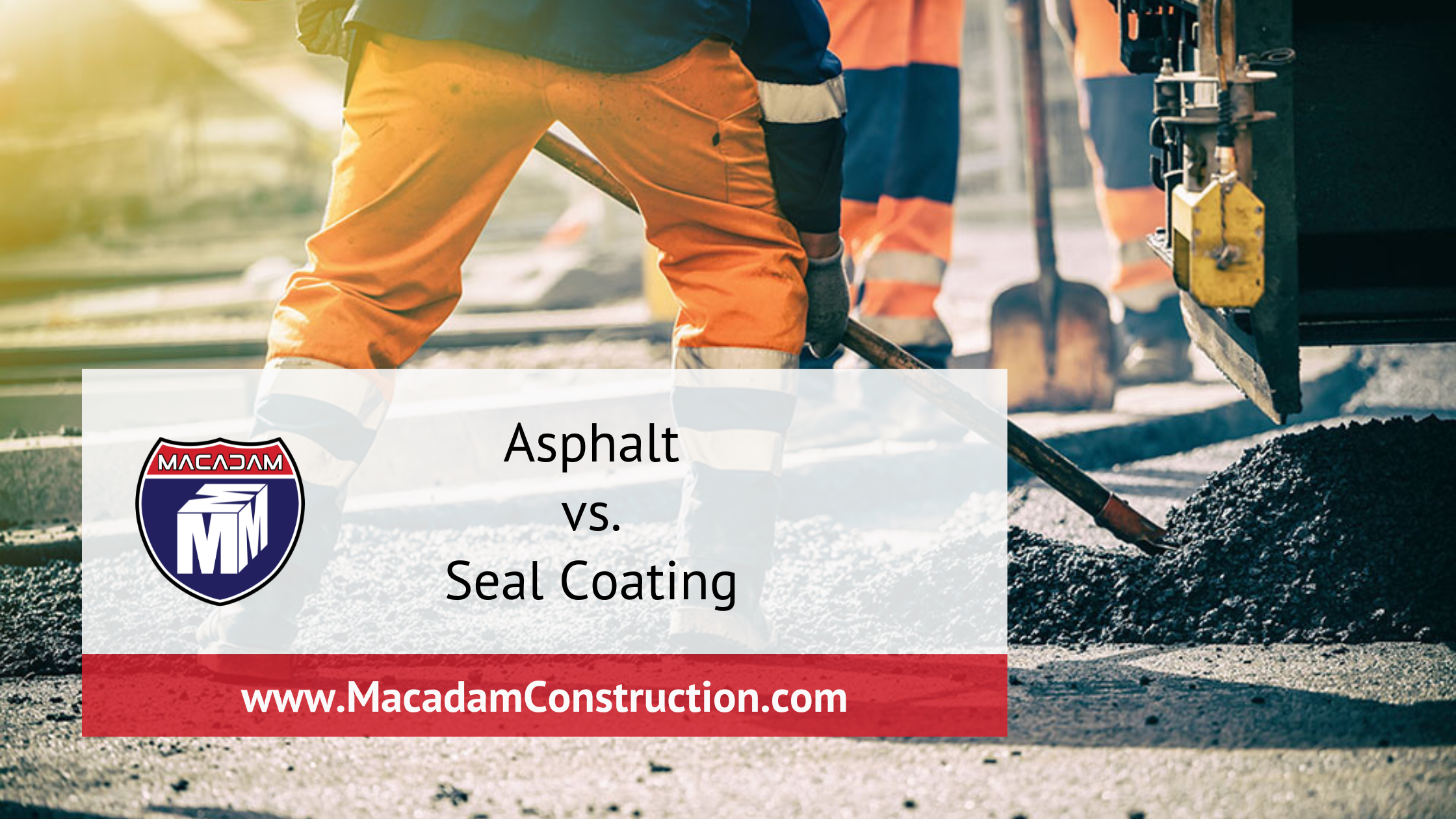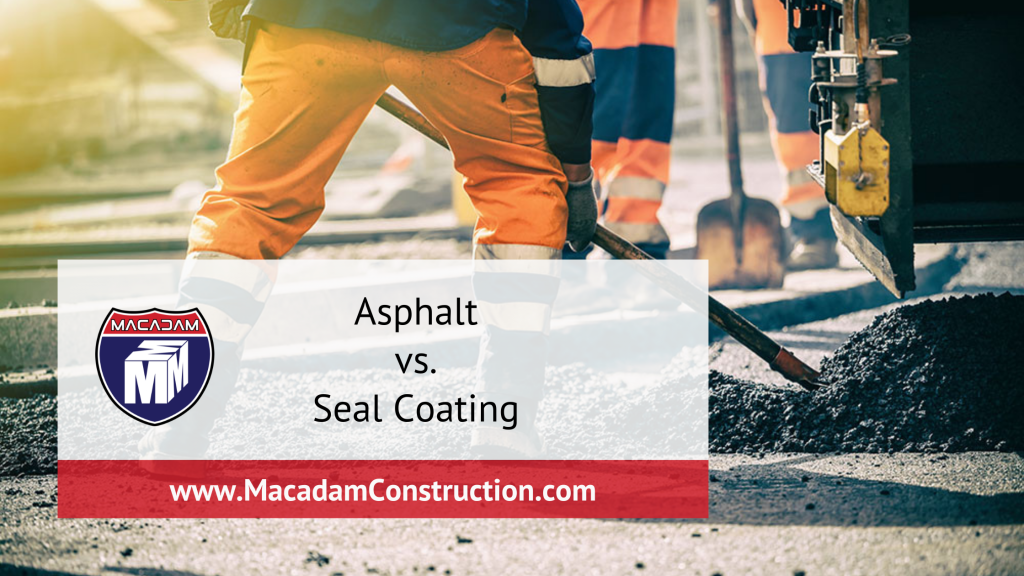
Asphalt vs. Seal Coating
What is the difference? What is right for my paving project?
When it comes to paving projects, one of the most common questions that arises is whether to use asphalt or seal coating. Both materials have their advantages and disadvantages, and the choice ultimately depends on the specific needs of the project. In this article, we’ll take a closer look at asphalt and seal coating, and compare the pros and cons of each.
What is Asphalt?
Asphalt is a petroleum-based material commonly used for paving roads, parking lots, and driveways. It is made up of a mixture of aggregates (such as sand, gravel, and crushed stone) and a binder (typically asphalt cement). The mixture is heated to a high temperature and then applied to the surface, where it hardens and provides a durable, smooth surface.
Pros and Cons of Asphalt
Pros of Asphalt:
- Durability: Asphalt is a highly durable material that can withstand heavy traffic and extreme weather conditions. It is designed to be flexible and can expand and contract with temperature changes.
- Smooth surface: When properly installed, asphalt provides a smooth surface that is easy to drive on. This makes it a popular choice for commercial and residential driveways.
- Quick installation: Asphalt can be installed quickly, which means your project can be completed faster than with other materials. This is particularly useful for large projects or time-sensitive applications.
- Cost-effective: Asphalt is often less expensive than other paving materials, making it a cost-effective choice for many projects.
Cons of Asphalt:
- Maintenance: Asphalt requires regular maintenance, including filling in cracks and potholes and resealing the surface. Failure to properly maintain asphalt can result in significant damage and the need for costly repairs.
- Environmental impact: The production of asphalt can have a negative impact on the environment, as it is a petroleum-based product. In addition, old asphalt materials may end up in landfills, creating additional environmental concerns.
- Heat absorption: Asphalt absorbs heat, which can make it uncomfortable to walk on in hot weather. It can also contribute to the urban heat island effect, which can increase temperatures in urban areas.
- Limited color options: Asphalt is typically only available in black or dark gray, which may limit its aesthetic appeal in some situations.
What is Seal Coating?
Seal coating is a protective coating that is applied to asphalt surfaces to help prevent damage from weather, oil and gas spills, and other contaminants. The coating is made up of a mixture of asphalt emulsion, water, and mineral fillers, and is applied to the surface with a squeegee or spray equipment.
Pros and Cons of Seal Coating
Pros of Seal Coating:
- Protection: Seal coating helps to protect asphalt surfaces from damage caused by weather, oil and gas spills, and other contaminants.
- Aesthetics: Seal coating can improve the appearance of asphalt surfaces, making them look newer and more attractive.
- Cost-effective: Seal coating is less expensive than replacing an entire asphalt surface, making it a cost-effective solution for maintaining and protecting asphalt surfaces.
- Quick installation: Seal coating can be applied quickly, which means your project can be completed faster than with other materials.
Cons of Seal Coating:
- Limited durability: Seal coating is not as durable as asphalt and will need to be reapplied every few years to maintain its protective properties.
- Limited effectiveness: Seal coating is not effective for repairing cracks or other damage to the surface of the asphalt.
- Weather limitations: Seal coating cannot be applied in cold or wet weather, which can limit the time of year when it can be used.
- Slipperiness: Seal coating can become slippery when wet, which can create safety concerns.
- Limited color options: Seal coating is typically only available in black or dark gray, which may limit its aesthetic appeal in some situations.
The Key Differences Between Asphalt and Seal Coating
Asphalt and seal coating are two different materials used for paving and maintaining surfaces, and they have some key differences:
- Material Composition: Asphalt is made from a mixture of aggregate (stone, sand, and gravel) and a binder (usually asphalt cement), while seal coating is a mixture of asphalt emulsion, water, and additives.
- Purpose: Asphalt is used as the primary material for paving roads, parking lots, and driveways, while seal coating is used as a protective coating to extend the life of asphalt surfaces.
- Durability: Asphalt is a highly durable material that can withstand heavy traffic and extreme weather conditions, while seal coating is less durable and needs to be reapplied every few years to maintain its protective properties.
- Appearance: Asphalt is typically dark, while seal coating can be black or dark gray. Seal coating can also provide a glossy or matte finish, depending on the application.
- Cost: Asphalt is generally more expensive than seal coating, especially for large-scale projects. However, asphalt is a longer-lasting solution that may provide a better return on investment over time.
- Installation: Asphalt requires specialized equipment and trained professionals for installation, while seal coating can be applied using a sprayer or roller.
Asphalt and seal coating serve different purposes and have different characteristics. Asphalt is a durable material used for primary paving applications, while seal coating is a protective coating used to extend the life of asphalt surfaces. The choice of material depends on the specific needs of the project and should be carefully considered. A qualified paving contractor can help determine the best solution for your needs.
Which is Right for Your Paving Project?
When deciding between asphalt and seal coating, consider the specific needs of your project. If you are paving a new surface or need to replace an existing surface that is severely damaged, asphalt is likely the best choice. However, if you are looking for a cost-effective way to protect an existing asphalt surface and improve its appearance, seal coating may be the way to go.
Ultimately, the choice between asphalt and seal coating depends on a variety of factors, including budget, time constraints, and the specific needs of the project. Ultimately, our team at Macadam Asphalt and Paving can help you make an informed decision and provide guidance on the best approach for your particular situation.


